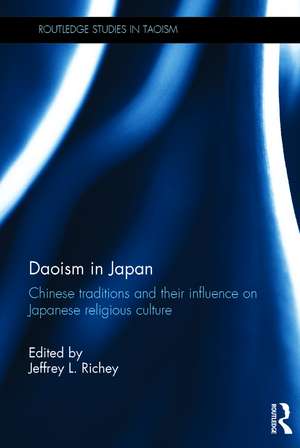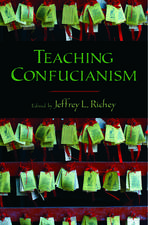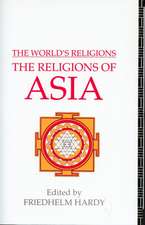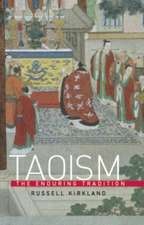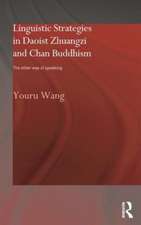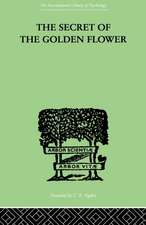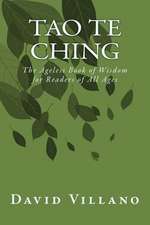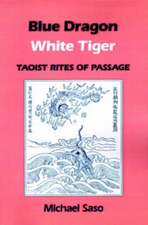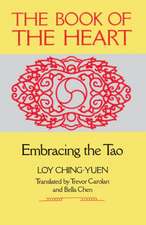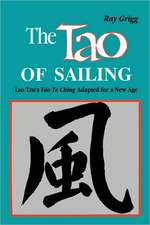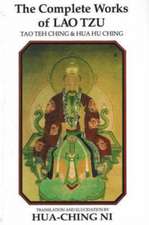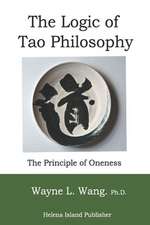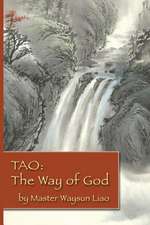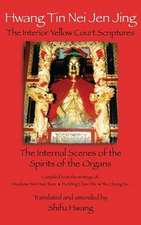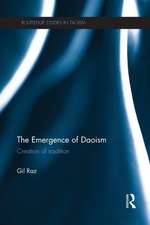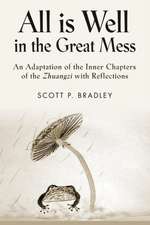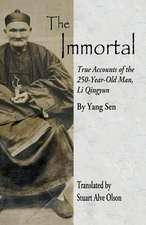Daoism in Japan: Chinese traditions and their influence on Japanese religious culture: Routledge Studies in Taoism
Editat de Jeffrey L. Richeyen Limba Engleză Hardback – 19 mai 2015
Daoism in Japan provides an exploration of the particular pathways by which Daoist traditions entered Japan from continental East Asia. After addressing basic issues in both Daoist Studies and the study of Japanese religions, including the problems of defining ‘Daoism’ and ‘Japanese,’ the book looks at the influence of Daoism on ancient, medieval and modern Japan in turn. To do so, the volume is arranged both chronologically and topically, according to the following three broad divisions: "Arrivals" (c. 5th-8th centuries CE), "Assimilations" (794-1868), and "Apparitions" (1600s-present). The book demonstrates how Chinese influence on Japanese religious culture ironically proved to be crucial in establishing traditions that usually are seen as authentically, even quintessentially, Japanese.
Touching on multiple facets of Japanese cultural history and religious traditions, this book is a fascinating contribution for students and scholars of Japanese Culture, History and Religions, as well as Daoist Studies.
| Toate formatele și edițiile | Preț | Express |
|---|---|---|
| Paperback (1) | 414.32 lei 43-57 zile | |
| Taylor & Francis – 28 iun 2018 | 414.32 lei 43-57 zile | |
| Hardback (1) | 1057.09 lei 43-57 zile | |
| Taylor & Francis – 19 mai 2015 | 1057.09 lei 43-57 zile |
Preț: 1057.09 lei
Preț vechi: 1289.13 lei
-18% Nou
Puncte Express: 1586
Preț estimativ în valută:
202.27€ • 211.76$ • 167.37£
202.27€ • 211.76$ • 167.37£
Carte tipărită la comandă
Livrare economică 07-21 aprilie
Preluare comenzi: 021 569.72.76
Specificații
ISBN-13: 9781138786493
ISBN-10: 1138786497
Pagini: 282
Ilustrații: 25 black & white illustrations, 2 black & white tables, 13 black & white halftones, 12 black & white line drawings
Dimensiuni: 156 x 234 x 20 mm
Greutate: 0.52 kg
Ediția:1
Editura: Taylor & Francis
Colecția Routledge
Seria Routledge Studies in Taoism
Locul publicării:Oxford, United Kingdom
ISBN-10: 1138786497
Pagini: 282
Ilustrații: 25 black & white illustrations, 2 black & white tables, 13 black & white halftones, 12 black & white line drawings
Dimensiuni: 156 x 234 x 20 mm
Greutate: 0.52 kg
Ediția:1
Editura: Taylor & Francis
Colecția Routledge
Seria Routledge Studies in Taoism
Locul publicării:Oxford, United Kingdom
Public țintă
PostgraduateCuprins
Introduction Conjuring Cultures: Daoism in Japan Part 1: Arrivals 1. Pleiades Retrieved: A Chinese Asterism’s Journey to Japan 2. Daoist Deities in Ancient Japan: Household Deities, Jade Women and Popular Religious Practice 3. Framing Daoist Fragments, 670-750 4. Daoist Resonance in a "Perfected Immortal": A Case Study of Awata no Ason Mahito Part 2: Assimilations 5. Onmyōdō Divination Techniques and Daoism 6. The Laŏzĭ and the Emergence of Shintō at Ise 7. Demarcation from Daoism in Shinran’s Kyōgyōshinshō 8. Kōshin: Expelling Daoist Demons with Buddhist Means Part 3: Apparitions 9. The Zhuāngzĭ, Haikai, and the Poetry of Bashō 10. The Eight Trigrams and Their Changes: Divination in Early Modern Japan 11. Crossing the Borders: The Magical Practices of Izanagi-ryū
Notă biografică
Jeffrey L. Richey is Associate Professor of Religion and Asian Studies at Berea College, USA, and the author of Confucius in East Asia: Confucianism’s History in China, Korea, Japan, and Viet Nam (2013), among other works on East Asian religious history.
Descriere
The influence of Daoism traditions on Japanese religious culture is vast, longstanding and multifaceted. This book focuses on the multiple legacies of Daoism in Japan from antiquity to the present, providing an exploration of the particular pathways by which Daoist traditions entered Japan from continental East Asia. It addresses the basic issues in both Daoism Studies and the study of Japanese religions and demonstrates how Chinese influence on Japanese religious culture ironically proved to be crucial in establishing traditions that are usually seen as authentically, even quintessentially, Japanese.
